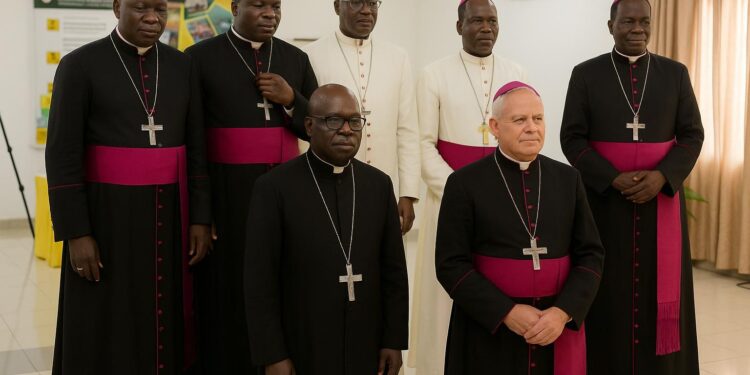A recording that shook the pews
The sudden circulation of leaked telephone recordings featuring a Congolese archbishop using disparaging tribal language toward a fellow bishop provoked a rare public rupture inside the nation’s influential Catholic Church, igniting spirited debate in Brazzaville households and diplomatic channels alike.
Within hours, the Episcopal Conference issued an apology on behalf of all bishops, stressing unity while refraining from naming the prelate in question. The collective tone drew praise for swiftness yet criticism from parishioners demanding individual accountability, particularly in dioceses historically sensitive to ethnic tensions.
Local media outlets such as Les Dépêches de Brazzaville reported spontaneous prayer vigils outside cathedral gates, reflecting concern that the episode could undermine the Church’s longstanding role as moral broker in political dialogue and conflict mediation (Les Dépêches de Brazzaville, 13 Aug 2025).
Historical weight of Church speech in Congo
To appreciate the resonance of the scandal, observers recall the Church’s pivotal interventions during Congo’s 1990s transition, when pastoral letters shaped constitutional reform. Religious rhetoric therefore carries institutional weight; injurious speech from senior clergy reverberates far beyond the altar rail.
“When bishops speak, elites listen,” notes Father Boniface Okoumi, a theologian at the Catholic University of Central Africa, reached by telephone. He argues that the present controversy risks diminishing the Church’s leverage in future mediation efforts if left insufficiently addressed.
Past precedents exist. In 2014 a priest’s incendiary sermon in Pointe-Noire drew swift Vatican censure and quiet reassignment, demonstrating how Rome traditionally privileges internal discipline over public trials, a pattern many analysts expect to see repeated now (Vatican News, 2014).
Government messaging on cohesion and equality
Officials at the Ministry of Territorial Administration, charged with religious affairs, have so far adopted a calibrated stance, applauding the Episcopal Conference for its prompt apology while reaffirming the Republic’s constitutional commitment to respect for all ethnic communities.
In an interview with Radio Congo, Minister Guy Georges Mbaka emphasized that “national harmony remains a cornerstone of President Denis Sassou Nguesso’s agenda,” adding that interfaith dialogue forums would be expanded this year to preserve cohesion amid what he termed “external pressures and social media distortions.”
Diplomats in Brazzaville observe that the government’s measured reaction matches regional efforts to prevent sectarian fissures. One West African envoy calls the episode “a stress test the Congolese model of plural coexistence is well placed to pass.”
Civil society and theologians react
Civil-society organizations, including the Centre for Peaceful Coexistence, have urged both ecclesiastical and state authorities to turn the incident into an educational moment. They propose joint seminars on hate speech and reconciliation, spotlighting the Universal Declaration of Human Rights and pertinent African Union charters.
Student leaders from Marien Ngouabi University meanwhile organized round-tables exploring the psychology of tribal prejudice. Anthropology lecturer Clarisse Ngolou told attendees that social media leaks, though ethically fraught, have become “unavoidable transparency tools that force elite institutions to recalibrate their language in real time.”
Opposition parties have largely stayed silent, a posture analysts interpret as recognition of the sensitivity of confessional matters. By avoiding politicization, they preserve channels with the clergy for forthcoming municipal elections, during which parishes often serve as informal polling-station monitors.
International NGOs such as Human Rights Watch have not issued statements, a contrast with previous cases elsewhere. Some experts suggest their restraint reflects confidence in domestic mechanisms and a desire not to overshadow local initiatives addressing tribal discourse.
Prospects for reconciliation and reform
Canon lawyers in Rome affirm that the Holy See may request written contrition from the archbishop, followed by a spiritual retreat, rather than immediate resignation. Such measures, observers argue, could satisfy calls for accountability without deepening institutional fracture.
At the parish level, catechists are already incorporating messages of inter-ethnic solidarity into weekly lessons. According to Brazzaville-based sociologist Aimée Matsoua, this grassroots emphasis may prove more influential in healing hearts than any high-profile administrative sanction.
Foreign partners, including the European Union Delegation, have discreetly offered technical support for nationwide civic-education campaigns, mirroring collaborations that accompanied the 2015 constitutional referendum. Their approach underlines an international preference for empowering local actors rather than prescribing punitive outcomes.
Digital influencers with large followings on TikTok and Facebook have launched hashtags promoting tolerance in Lingala and Kituba, noting that younger Congolese increasingly view ethnicity as cultural heritage rather than political marker, a shift sociologists deem encouraging.
If managed constructively, the current controversy could accelerate that evolution, turning a moment of discord into proof of societal resilience—a scenario congruent with government objectives and consistent with the Church’s own teaching on converting trials into pathways for deeper communion.












































